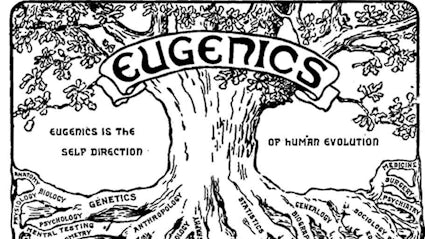
The term "eugenics" was coined by Sir Francis Galton in his 1883 book Inquiries into Human Faculty and its Development and derives from the Greek "eu-genes", meaning "well-born." There Galton defines eugenics as "the science of improving stock—not only by judicious mating, but whatever tends to give the more suitable races or strains of blood a better chance of prevailing over the less suitable than they otherwise would have had." Despite the fact that Galton's talk of "stock" and "strains of blood" require some 21st-century updating, this quote succinctly captures three key features of eugenics: its aim, the means of achieving that aim, and the relationship of eugenics to science. Galton's "stock" is our species, human beings, and his "strains of blood" are sort or kinds of people. Thus, eugenics aims to use science for human improvement over generations by changing the composition of human populations through favouring the reproduction of certain sorts or kinds of people.
Although Galton characterized eugenics as itself a science, it was also a social movement, one that gained traction in many countries early in the 20th-century. The most notorious national context for eugenics was that of Nazi Germany under the banner of "racial hygiene"—policies that resulted in the forced sterilization and killings of many disabled and Jewish people as part of state-sponsored policies directed at "inferior peoples". But eugenic policies and laws also emerged in many North American jurisdictions, including in more than thirty states in the United States of America, and in western Canada with the introduction of the Sexual Sterilization Act of Alberta in 1928, and a derivative act in British Columbia in 1933. In recent years, historians and other researchers and community activists have drawn attention to the broader reach of the eugenics movement across the globe.
While eugenic ideas and practices as traditionally conceived are largely discredited today, new concerns have emerged with advances in reproductive technology and growing knowledge about human heredity. These concerns focus on the re-emergence of strands of eugenic thinking in new practices and policies, what is sometimes called a concern with newgenics.
One's view of the historical legacy of eugenics and its relationship to contemporary debates should be informed by the recent growth in knowledge about the eugenic past. That past is more complicated, and more encompassing, than the simple association between eugenics and the Nazis might suggest. In light of that, an attitude of humility may be our best way forward. Many advocates of eugenics in the 20th-century saw themselves as progressive, as acting for human good, and as doing so based on the best science of the day; it would be a dangerous kind of complacency to think that contemporary views of reproductive choice, human variation, and the uses of science and technology for human melioration show no traces of a eugenic past.
-Robert A. Wilson
Galton, F. (1865). Hereditary talent and character. Macmillan's Magazine, 12, 157-166 & 318-327.
Galton, F. (1869).Hereditary genius. London: MacMillan and Company.
Galton, F. (1883).Inquiries into human faculty and its development. London: MacMillan and Co.
Kevles, D.J. (1985). In the name of eugenics: genetics and the uses of human heredity. New York: Knopf.
Rafter, N. (ed.) (1988). White trash: the eugenic family studies, 1877-1919. Boston, MA: Northeastern University Press.
Grekul, J., Krahn, H., & Odynak, D. (2004). Sterilizing the ‘feeble-minded’: eugenics in Alberta, Canada, 1929-1972. Journal of Historical Sociology, 17, 358-384.
Muir, L. (2014). A whisper past: childless after eugenic sterilization in Alberta. Vancouver, BC: Friesen Press.
Bashford, A., Levine, P. (Eds.). (2010). The Oxford handbook of the history of eugenics. New York: Oxford University Press.
